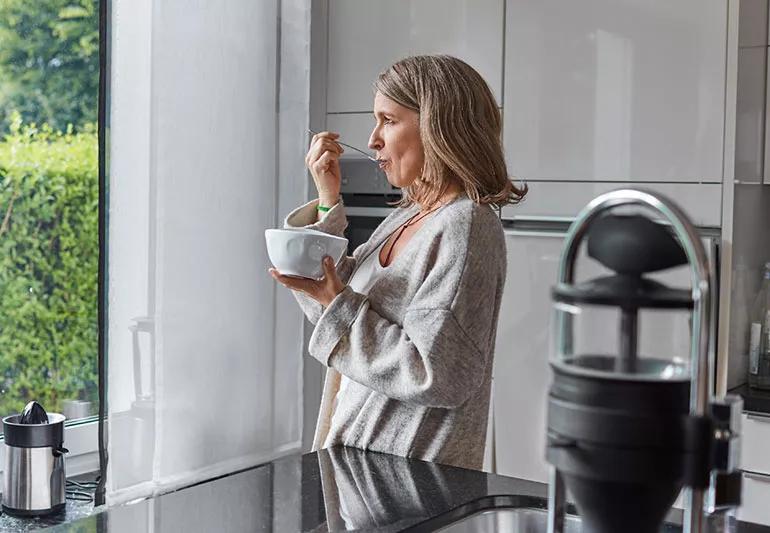The Short Answer from a gastroenterologist

Image content: This image is available to view online.
View image online (https://assets.clevelandclinic.org/transform/3d9b8209-5a85-4582-93ee-4e4e180b2a9c/menopauseConstipation-1278919363-770x533-1_jpg)
menopausal woman eating breakfast in kitchen
It’s very common in the post-menopausal or peri-menopausal period for a person to develop constipation. Through complex mechanisms, shifts in hormones can worsen constipation.
Advertisement
Cleveland Clinic is a non-profit academic medical center. Advertising on our site helps support our mission. We do not endorse non-Cleveland Clinic products or services. Policy
Also, as we get older, it’s more likely that we’ll have other conditions that require medications. Depending on the drug, it can become more difficult to pass stools.
There’s also a higher likelihood that people become less active as they get older. This can be a result of arthritis, fatigue or other reasons and this, too, contributes to constipation.
But you don’t have to be miserable throughout this. We turned to gastroenterologist Christine Lee, MD, for advice on how to maneuver through this difficult transition.
It’s not surprising when people develop constipation as they get older. You shouldn’t be alarmed by it, as long as you’ve had a colon cancer screening and continued surveillance if applicable at the appropriate time.
To remedy constipation, you want to manage symptoms. Here are some tips:
Become more active, Dr. Lee recommends. “Increasing your physical activity, including resistance training for core body muscle building can help relieve the symptoms,” she says. Don’t forget hydration during the day (drink plenty of water).
If you can eat between 25 and 50 grams of processed (examples: bread, noodles) and unprocessed (fruits and vegetables) fiber each day, this can help you have more regular bowel movements and more efficient bowel movements, says Dr. Lee.
Advertisement
Look at your medications to see which ones may cause constipation. If you suspect a drug you are taking is causing your problem, work with your primary care provider to address it.
Once you’ve tried to address some of those lifestyle issues, you can try taking a gentle stool softener. “You could start with taking polyethylene glycol (17 grams) every day, every other day or as needed every few days to help you have a better bowel movement,” says Dr. Lee
Other different types of laxatives, such as docusate or senna, can help you if your problem is more severe.
If those over-the-counter stool softeners and laxatives are not effective for you, Dr. Lee suggests talking to a gastroenterologist to discuss what prescription medications might be helpful in addressing your constipation and to rule out any organic process that might be causing your constipation.
Advertisement

Sign up for our Health Essentials emails for expert guidance on nutrition, fitness, sleep, skin care and more.
Learn more about our editorial process.
Advertisement
From staying hydrated to staying on schedule, these tips can help you stay regular on-the-go
Prunes earn the title of ‘nature’s remedy’ for bowel movement issues
A dietitian weighs in on social media’s popular constipation recommendation
Eat foods high in fiber, drink water and consider using a laxative
It could be diet or it could be something else
Here’s the 411 on No. 2 — and 3 ways to keep your inner roadways traffic-free
Chronic constipation could be a sign of something else
Type 2 diabetes isn’t inevitable with these dietary changes
Applying a hot or cold compress can help with pain
Pump up your iron intake with foods like tuna, tofu and turkey